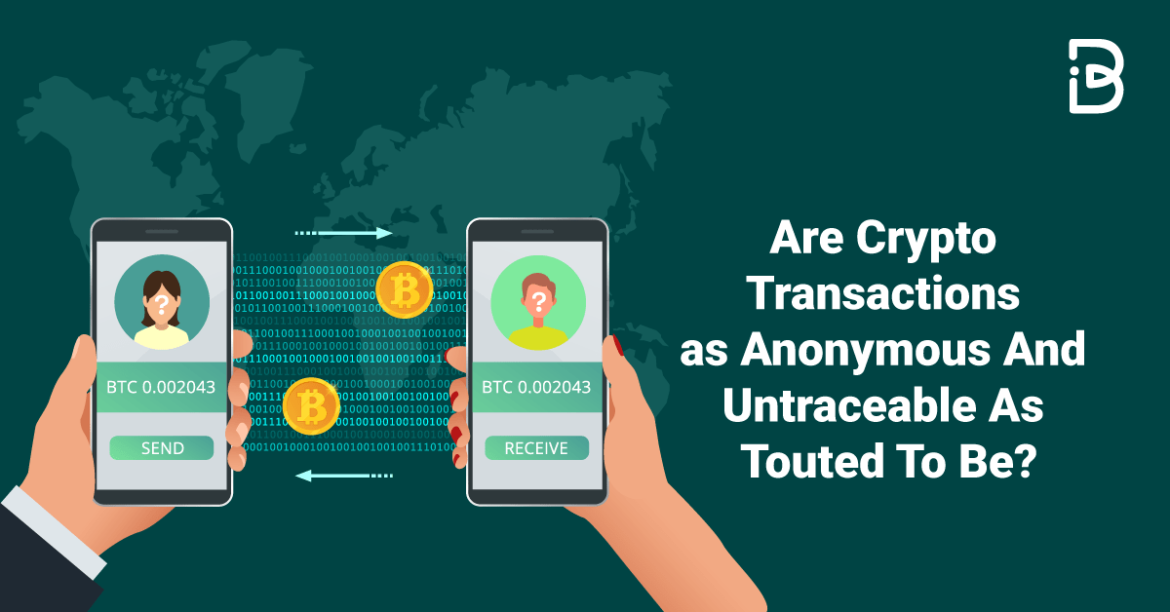Whenever one thinks of cryptocurrencies, the first thing that comes to mind is anonymity. Ever since the original 2008 original Bitcoin white paper was published, introducing the concept of blockchain technology through Bitcoin, it was promoted to be anonymous and private.
In its initial days, crypto was considered a safe haven for criminals because it seemed difficult to track malicious identities. The notion that crypto transactions are anonymous and almost impossible to trace prevailed and how.
However, in recent times, questions can be raised about the anonymity of crypto transactions. It is becoming increasingly difficult to conduct crypto transactions privately; personal information such as the investor’s name, contact number, and address can be traced.
In this post, let us discover to what extent crypto transactions are anonymous and traceable and what impact it has on the privacy aspect of cryptocurrencies!
Are Crypto Transactions Anonymous?
Table of Contents
As bizarre as it may sound, crypto transactions can actually be traced! Cryptocurrency transactions are recorded on a blockchain, which is generally public. However, crypto trades are not necessarily linked to an identity, providing users a bit of anonymity.
Several incidents of money laundering have happened in the past that have shown us that crypto transactions are not entirely anonymous. One of them was demonstrated by the recent bust in Manhattan as well as last year’s Colonial Pipeline hack, in which authorities were able to recoup some of the ransom payment from the attackers.
Crypto transactions are almost always converted into US Dollars or some other heavily regulated and government-backed currency, making it convenient to trace. However, many are the promises of anonymity and privacy; blockchain will always be open to the public.
The idea of blockchain introduced that there is no third-party involvement in blockchain transactions. However, blockchain transactions are documented using the sender’s and receiver’s wallet addresses. The transactions that come in and out of these wallets are recorded on a digital ledger, which is open to the public. Moreover, ever since the central authorities have made KYC mandatory, it is eventually possible to trace the identity behind the crypto-wallet addresses. Consequently, cryptocurrency transactions are often known as pseudo-anonymous transactions.
Is Privacy an Issue With Crypto?
Bitcoin is the most secure and private form of payment ever made available. However, government or some malicious entity may still be able to acquire the details of the person behind that address. One of the most common ways to do this is through Password Phishing. This is the most-used way of password retrieval.
One reason this is so is that the U.S. government is ramping up its crypto regulatory efforts; it is targeting privacy-protecting projects like never before. Central authorities can quite easily match Bitcoin transactions to real people as off-ramps like cryptocurrency exchanges collect personally identifiable information about their customers.
In fact, law enforcement agencies have even said they prefer it when criminals use the asset because it is so easily traceable!
Recommended: Phishing Attack the ultimate guide
How Can You Search for A Crypto Wallet Address?
The process of finding a crypto wallet address has been made quite easy with the help of tools such as Bitcoin Explorer, Ethereum Explorer, etc. One thing to be noted here is that finding a crypto wallet address does not necessarily mean that you have unveiled the identity of the person behind it.
These explorers sure make it easy to find the transactions and addresses, but revealing the identity behind that transaction is a tough nut to crack. Because someone’s wallet address may not be his real name. A Bitcoin address is called a pseudonym, an alias a person uses to carry out their crypto transactions.
Nevertheless, certain wallets allow you to transact completely anonymously. This becomes impossible, though, when you are carrying out transactions on an exchange that has mandated KYC on its platform.
Final Thoughts
In the end, it comes down to the fact that no crypto transaction is completely anonymous and impossible to trace. Every transaction leaves an audit trail, following which we can uncover some part of the identity of the person behind it. There are some cryptocurrencies that people claim to be 100 percent anonymous. Although, any such claims should be taken skeptically.
Being said that, it does not necessarily imply that crypto transactions are unsafe or are revealed to the public. Cryptocurrencies are, to date, touted as the most secure form of payment!
About ImmuneBytes
ImmuneBytes provides businesses and startups with all-encompassing smart contract auditing solutions so their apps can get off to a secure start. We set out on this trip with the intention of fostering security in the next blockchain era while enhancing the functionality of massively parallel systems.
In order to prevent flaws from escaping, ImmuneBytes conducts strict smart contract audits. These audits use static and dynamic analysis, code inspection, and gas optimization.
Additional Read: Crypto Rug Pull How to Avoid?

